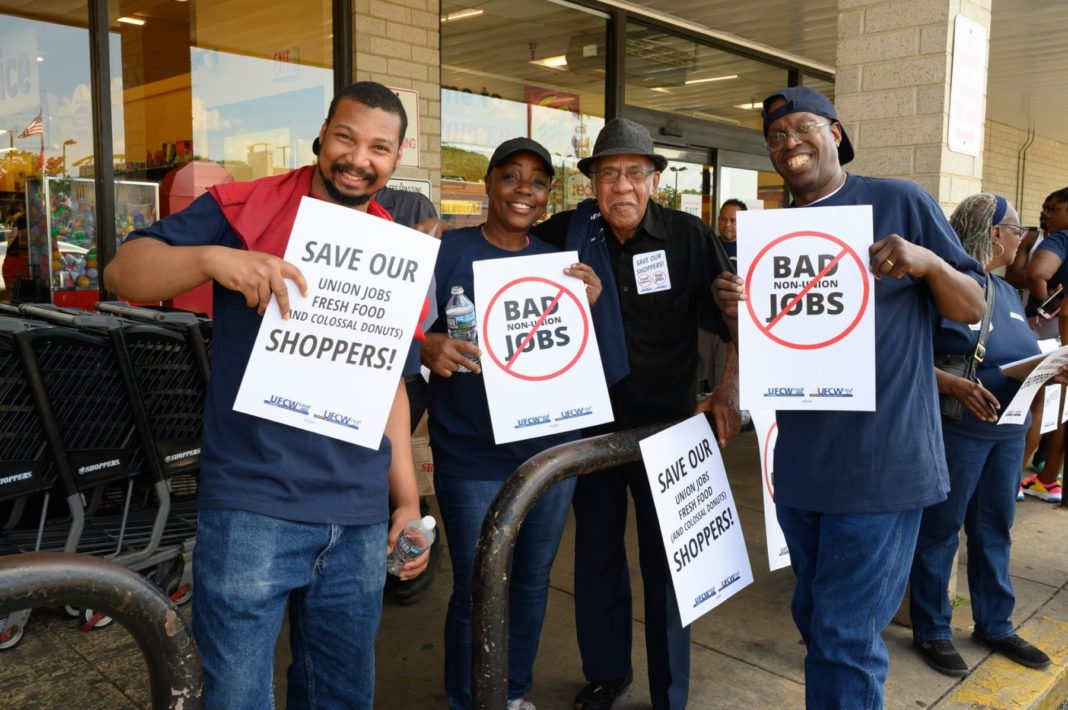With still no word of the status on the remaining 44 Shoppers Food and Pharmacy in the Baltimore-Washington market, the area’s two largest retail affiliated labor unions representing more than 4,000 Shoppers clerks and meatcutters have unveiled a plan to bring more attention to the plight of those workers. Since parent firm UNFI announced almost a year ago that it planned to sell its corporately-owned stores, store associates have been given no specific information about their future status with the retailer, which began in Washington, DC in 1939.
Beginning on June 24, United Food and Commercial Workers Local 400 (Washington area) and UFCW Local 27 (Baltimore area) have held Shoppers employees’ “rallies” at 17 stores – 15 in the Washington area and two in Baltimore.
“Our members have been left in the dark for far too long,” said Mark Federici, president of UFCW 400, the largest UFCW local in the country. “After decades of faithfully serving the community, it is irresponsible to leave these hardworking men and women to wonder what the future will hold. We are calling on the company to ensure that these locations remain grocery stores with strong union jobs.”
Actually, the decision to sell or close all of UNFI’s corporate stores was initially made by former Shoppers parent Supervalu in 2017. In March 2018, 24 of the 38 remaining Farm Fresh stores in the Tidewater area of Virginia were sold and Supervalu continued to seek buyers for its other company-owned supermarkets, which once totaled about 225 units. When the sale of the Eden Prairie, MN wholesaler/retailer was announced in late July 2018 (and completed in October), UNFI said it would continue to divest itself of all corporately-owned supermarkets. While still under SVU control in September, regional chain Schnuck’s supermarkets acquired 19 of the remaining 38 Shop ‘n Save stores in the St. Louis area.
Additionally, under UNFI ownership, the company sold five Maryland, Pennsylvania, Virginia and West Virginia stores to Ahold Delhaize USA’s Giant/Martin’s unit. In November 2018, Coborn’s, one of Supervalu/UNFI’s largest wholesale customers, purchased seven Hornbacher’s stores in North Dakota and Minnesota.
Selling the Shoppers units, UNFI’s second largest retail banner (after Cub Foods), has become problematic. During the past nine months, UNFI has sold four units to Giant Food (including the recently announced Seven Corners store in Falls Church, VA), but the bulk of its stores (which once totaled approximately 60 supermarkets) have been on the market for about a year with little communication about their status from UNFI.
One key hurdle is likely Shoppers’ participation in a pension fund where its active and retired members comprise about 95 percent of the plan. The fund, like many other pension plans, is significantly unfunded (reportedly more than a $135 million shortfall) and UNFI has reportedly tried to transfer that liability (or a portion of it) as part of sales strategy to at least some interested bidders.
“These stores would be a nice add-on to our base, but they are not ‘must-haves’ for us,” said a retail executive whose company was interested in potentially purchasing some of the Shoppers stores. “Unless they take the pension fund issue off the table, I don’t think you’ll see a lot of interest in the mass selling of stores.”
Sources have told us that along with Giant (the largest retailer in Baltimore-Washington), Harris Teeter and Lidl have expressed interest in multiple Shoppers locations. Safeway, the second largest retailer in the B-W market, has reportedly not been part of the bidding process.
Several landlords at properties that house Shoppers stores (but technically don’t control those leaseholds) have also told us that interested retailers have contacted them as a fallback in case of store closures where control could revert back to the landlord.
“The whole process is a mess,” said another retail executive, whose company has also been part of the negotiations with UNFI. “This should have been completed at least six months ago. Our company has done a number of store acquisitions over the past 20 years, but this situation has been poorly handled. I’m certain the pension fund issue is complicating matters, but as a very competitive market continues to evolve, Shoppers is losing value every day. And to leave the associates in ‘no man’s land’ is unconscionable as well.”
Also creating declining value was UNFI’s decision to sell its prescription lists to Walgreens and CVS in April which was part of the decision to close 30 Shoppers’ in-store pharmacies.
“Penny-wise and pound foolish,” is how one former Shoppers executive described the move. “If you’re trying to sell an entire store and you remove the pharmacy that store will immediately lose traffic and sales and diminish the value of the store. And to sell the scrip lists to the two largest drug chains, who are competitors, makes little sense.”
As for further union activity, Federici said his group plans to keep the public pressure on UNFI to consider keeping the stores open.
“We will continue to utilize a variety of methods to inform the community about this unfair situation. We have the support of customers, civic leaders and elected officials. We’re talking about human decency here. What UNFI has practiced for almost a year is nothing short of corporate malpractice,” Federici exclaimed.
And the overall balance sheet for UNFI leaves little reason for optimism. During its most recently completed third quarter ended April 27 (and announced in June), the company reported a negative 3.6 percent drop in its legacy Supervalu business (primarily independent wholesale– its largest segment). The company’s stock has plummeted more than 75 percent over the past year, closing at $9.65 per share on July 10.





